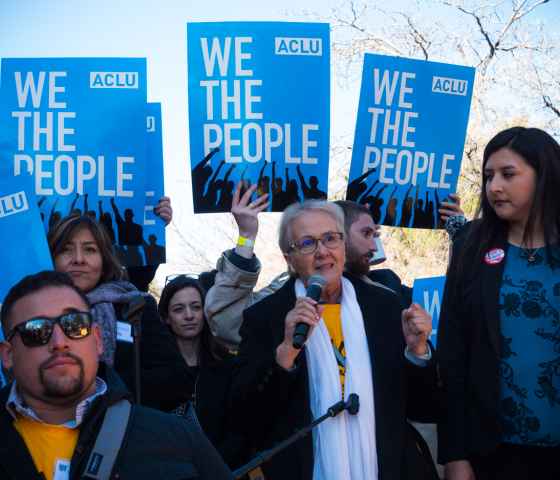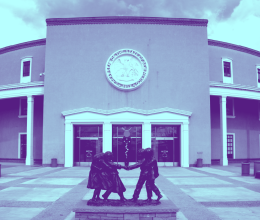Six months into President Trump's second term, New Mexico communities are experiencing unprecedented challenges under the administration's aggressive immigration enforcement policies. In this interview, Rebecca Sheff, senior staff attorney specializing in immigrants’ rights, discusses how the administration’s policies have uniquely impacted New Mexico.
Carla Palacios (CP): Rebecca, it's now mid-July, and immigration issues have consumed a huge percentage of our work here at the ACLU of New Mexico since Trump took office in January. The pace and intensity of these policies have been crazy—we've seen everything from challenges to birthright citizenship to masked ICE agents conducting what can only be described as kidnappings in broad daylight. Communities across New Mexico are feeling the impact of these policies. Can you give us a sense of how dramatically the landscape has shifted since the inauguration? How can people protect themselves and their neighbors?
Rebecca Sheff (RS): The pace has definitely been unprecedented. What we're seeing is a deliberate strategy to rapidly expand enforcement capabilities while simultaneously eroding due process protections. The administration has essentially tried to weaponize every available tool—from military land transfers to visa revocations—to create a climate of fear and uncertainty.
CP: Let's dive into some specifics. Early this year, the Trump administration transferred about 400 square miles of public land in New Mexico to the military, creating a so-called “National Defense Area” along the border. What was the broader strategy behind this land transfer and how has it played out on the ground?
"The administration has essentially tried to weaponize every available tool"
RS: The administration established a zone along New Mexico's southern border, claiming it to be an extension of a military base in Arizona. Under this new zone, the government asserts that it is necessary to deploy troops to “assist” Border Patrol in detecting and apprehending people who cross seeking protection and safety.
The geographic contours of that zone have been murky. Nonetheless, the government has proceeded to arrest and charge people with “trespassing” onto a military base.
It’s really troubling the way this has played out—there are serious due process concerns for the people who are going through these federal criminal proceedings, and we’re concerned about what this means for the broader, enhanced militarization of New Mexico and how the border is being managed here.
CP: Early in Trump 2.0, the government indicated that it was exploring using military bases around the country, including Fort Bliss and the Kirtland Air Force Base, to facilitate mass deportations. Are there any developments in that?
RS: For a while, the government utilized Fort Bliss for flights to Guantanamo and other locations. The potential use of military bases in New Mexico and elsewhere for immigration detention and deportation flights is something we’ve continued to have active concerns about; we’re closely monitoring the situation—and we’re especially concerned now that the government has announced plans to build a new detention facility at Fort Bliss with 5,000 beds.
CP: Another aggressive initiative the administration undertook was the arbitrary mass revocations of international student visas, which affected many students in New Mexico. This led to a substantial victory on our side. Can you talk about the recent lawsuit we won on behalf of a Ghanaian doctoral student, K.O.D.?
RS: Certainly! We and our cooperating attorneys at Huffman Wallace & Monagle filed our own legal action on behalf of a doctoral student at New Mexico Tech, known by the pseudonym K.O.D., whose entire academic career was severely disrupted by his revocation of status. His studies and funding were immediately put on hold, his professional career was completely jeopardized, and he faced an immediate fear of being detained and deported.
Thankfully, we were able to secure a temporary restraining order on his behalf, and the government did eventually back down from this harsh initiative as a result of the litigation that was brought here and across the country on behalf of students. We’re staying vigilant about the threat of any additional arbitrary action, and we are grateful for our legal community’s responsiveness to the needs of students in our state.
CP: These policy changes are alarming. We've witnessed horrific acts of violence against immigrant communities, including the many arrests and disappearances of our community members. What do these escalations mean for everyone in New Mexico? How can folks protect themselves against arbitrary actions conducted by law enforcement?
"We are witnessing the erosion of everyone's rights."
RS: We’re living in a time where we’re seeing more aggressive and expansive actions by federal law enforcement than we have in recent memory. Collectively, we are witnessing the erosion of everyone's rights, with this administration's inhumane and unprecedented attacks impacting us all.
The federal government has taken drastic measures to expand the dragnet to funnel people into the detention and deportation pipeline, and a lot of this is taking place through racial profiling—we are rapidly entering a place where a person’s citizenship or legal status isn’t necessarily protective.
There are things people can do to keep themselves, their loved ones, and their communities safe; everyone needs to know their rights and be prepared to assert them when they are interacting with law enforcement. Knowing your rights can also help you be an effective witness when violations are happening to others. Documenting violations as they happen and sharing them with the public, especially on social media, can also help spread awareness.
We, along with our partners, offer extensive Know Your Rights trainings and materials throughout the state. We’re here to do everything we can to hold law enforcement accountable for the harms that they’ve caused and to deter unlawful actions.
It’s unconscionable that we’re all confronted with the risk of being approached by masked, armed individuals who don't self-identify as law enforcement officers—and we’ve seen how arbitrary, enforced disappearances are resulting from aggressive actions across the country. I recommend plugging in to your local community organizations, getting involved in mutual aid groups, and finding ways in which you can help support those on the front lines.
CP: Thank you for this sobering but important overview. Anything else you would like to add?
RS: It’s important for people to understand that this issue affects all of us, regardless of immigration status or citizenship. It's going to take all of us to stand up for ourselves and our most vulnerable community members against these violent actions.



